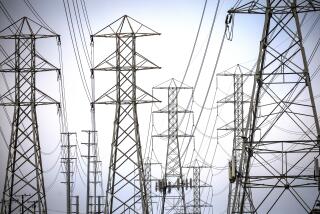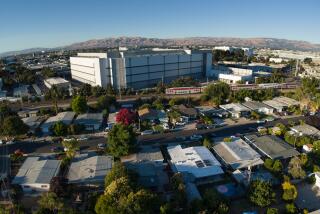Last-Ditch Pitch to Power Users
Anticipating an eventual state ban on the direct sale of electricity to customers, AES NewEnergy is offering deep discounts to Southern California businesses that sign on to sales contracts immediately.
AES spokesman Dave Potter said the company is trying to get customers enrolled in the so-called direct-access program before Thursday, when the California Public Utilities Commission is expected to suspend the right of energy users to buy electricity from anyone other than a public utility.
Houston-based Enron Corp. is also pursuing last-minute deals and hopes that the PUC won’t take away direct access, said company spokeswoman Peggy Mahoney.
“It’s a shame to take away choice,” she said.
In Huntington Beach alone, at least 600 businesses have received letters promising “Local Power for a Low Price.” The letters, sent by the city on behalf of AES, emphasize that the electricity being offered will be generated at the retooled AES plant on Huntington Beach’s coastline.
“What AES NewEnergy is doing is offering businesses throughout Southern California Edison’s territory . . . the option to buy this power generated at the Huntington Beach facility at rates substantially lower than what they’d get with Edison right now,” said Potter, a spokesman in the retail energy provider’s Los Angeles office.
Consumer Activists Criticize Campaign
The campaign was immediately criticized by consumer activists, who say the companies are trying to lock in big-money business customers at the expense of homeowners and other small energy users.
Mindy Spatt of the Utilities Reform Network said such deals will actually short-change California consumers, who will be left holding the tab for the long-term energy contracts that the state entered into during the height of this year’s power crisis.
“Direct access is always something that worked better for big customers and worked poorly for residential customers,” said Spatt, a spokeswoman for the San Francisco-based watchdog group. If businesses flee, “the rest of us will be stuck paying for the long-term contracts. The residential bills will go even higher.”
State officials have sought to guarantee that California will have an energy surplus in the future to avoid the sort of price spikes that caused chaos in the electricity market this past winter and spring.
But guaranteeing a surplus costs money. Under state regulations, the cost of the surplus will be passed along to the customers of the big utilities. If large users of electricity are allowed to bypass the utilities, “power rates paid by the remaining customers would rise,” according to a June 12 memo from the state treasurer and the heads of the Finance and Water Resources departments.
Those rising prices could create “a spiral of declining customers and rising power rates,” according to the memo, which urged the elimination of direct access.
Nonetheless, state officials say the AES deal is so small that it shouldn’t affect the state’s ability to pay off the long-term contracts.
“I don’t think there will be an impact . . . although the potential is there,” said Oscar Hidalgo, a spokesman for the Department of Water Resources, which negotiated on behalf of the state to buy energy from private suppliers in coming years.
AES is telling potential customers who sign up now that they would be grandfathered into the program--unless the PUC chooses not to allow that exemption, Potter of AES said.
Bill Workman, assistant city administrator for Huntington Beach, said businesses that sign on could see discounts of up to 30% off current Southern California Edison rates--and help ensure that power generated at the local plant stays in California.
AES has contacted hundreds of customers in Southern California who were previously enrolled in direct-sale programs, Potter said. Many have expressed interest, but AES still needs to analyze potential demand and usage before setting rates and negotiating contracts, he said.
40-Year-Old Generators Are Due Back Online
Ed Blackford, president of AES Huntington Beach, said the Waterfront Hilton and another Hilton hotel under construction next door have signed on to the deal. Attempts to reach Steve Bone, president of the company that owns both hotels, were unsuccessful.
The controversial plan to restart two gas-fired generators at the Huntington Beach plant has been approved by the California Energy Commission.
The remaining obstacles with the city of Huntington Beach and the South Coast Air Quality Management District were resolved Friday.
Two functioning generators provide 563 megawatts of power.
The two 40-year-old generators that will go back online in early September will produce 450 megawatts of power, enough to supply about 337,500 homes.
More to Read
Inside the business of entertainment
The Wide Shot brings you news, analysis and insights on everything from streaming wars to production — and what it all means for the future.
You may occasionally receive promotional content from the Los Angeles Times.











